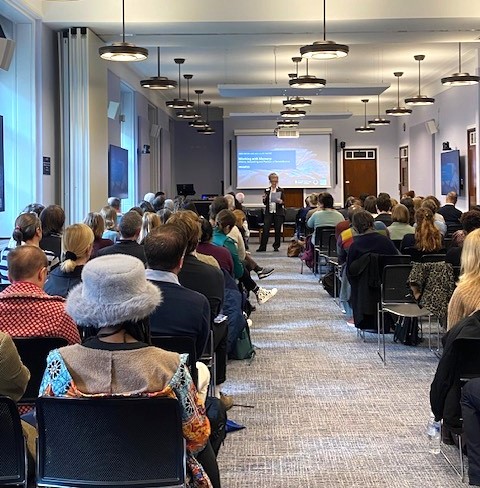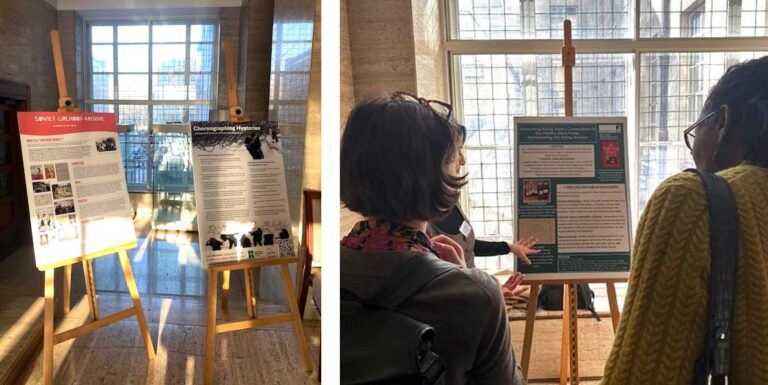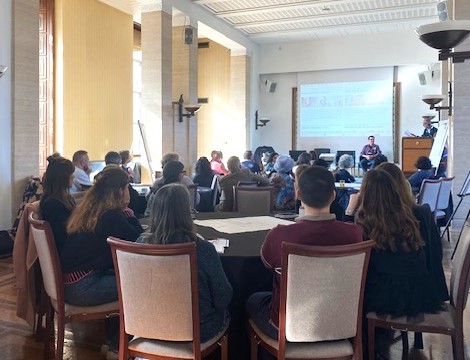History and Archives in Practice (HAP) is an event where historians and archivists come together to consider research practice and shared interests in collections, their interpretation and use. A partnership between The National Archives, Royal Historical Society, and the Institute of Historical Research, this year’s event took place on Wednesday 5 March at Senate House, London.
In this blog post, I take a moment to reflect on this year’s event and what the future of HAP looks like.
An impressive response
This year’s theme was Working with Memory: History, Storytelling and Practices of Remembrance. The response to our call for papers was astounding and the diversity of submissions was captured within the programme for HAP 2025, reflecting the strength of not only the theme, but the reputation that HAP has built over the past three years.

Topics ranged from war commemoration, police perspectives on the Battle of Orgreave, education and history, photography, place and memory, creative methodologies, digital remembrance, and community projects.
As well as traditional panels, we programmed moments outside of the typical conference programme to encourage conversation and connection: a lunchtime poster showcase, a walking tour around Bloomsbury run by staff from the Institute of Historical Research, and an interactive workshop about archives and audio drama run with Applied Stories and colleagues from The National Archives.

Archives and employees
The first panel of the day reflected on various business archives, including Boots and Nationwide Building Society, and their collaborative academic practices.
Sara Kinsey, Head of Historical Archives at Nationwide, discussed the ‘See Me Nationwide’ research project as an example of the relationship between businesses, place, and civic pride. Collecting oral history interviews from employees and turning these into films for both in-house Equality, Diversity, and Inclusion training and a pop-up exhibition at Swindon shopping centre (the town where Nationwide’s HQ is based), See Me Nationwide highlighted the positive contribution that employees have made to the national organisation and major local employer.
Hearing about the incredibly impactful and personal projects that business archives can have underlined the important positive relationship between archives and employees – where archives are about them and for them. Read more about See Me Nationwide on The National Archives’ website as a case study for our Archives Unlocked series.
Sound and sense of place
Later in the day, Fin Kennedy from Applied Stories, and Iqbal Singh and Elizabeth Haines from The National Archives, ran a workshop called ‘Archives Audio Hour’. Originally capped at thirty people, due to overwhelming interest, the workshop was attended by fifty people.
Examining how archive collections can be brought to life with sounds, using audio drama as its example, each table was assigned a continent and worked together to choose the sounds that could be used to evoke a sense of place within an audio drama based on archival material.

The opportunity for attendees to collaborate in the workshop was praised in feedback, and at the end of the session, attendees expressed that the workshop has inspired them to see their research differently to bring the archives that they use or work in to life.
Combining the material and the immaterial
In the penultimate session of the day, a moment in the panel with the British Online Archives struck me as summarising brilliantly the work that we do with HAP. While discussing the intersection between performance studies and archives, Beth Potter cited the scholar Diana Taylor, from 2003’s The Archive and the Repertoire: Performing Cultural Memory in the Americas.
Taylor discusses the ‘archive of supposedly enduring materials’ and what she calls the ‘repertoire of embodied practice/knowledge,’ acts that are ‘usually thought of ephemeral, nonreproducible knowledge’. I believe that this sums up beautifully what HAP is and can be even more so: one that combines the material with the immaterial – practice with archives and history.
Though ephemeral in a way – HAP is not recorded or streamed online – the event exists and has many lives after the day itself, including memories, connections, and joy. By championing the rich variety of research that historians, archivists, and practitioners do where theory meets practice, HAP showcases the latest findings across the research and archive sectors, while also facilitating networks and new partnerships through increased knowledge sharing with collaboration and community at its heart.
What’s next?
As part of this effort to collaborate with communities, HAP 2026 will take place in-person at Sheffield University Library on Thursday 16 April 2026. The call for papers and the theme will be released this summer and will be shaped in partnership with Sheffield.
A reflection of the memories, connections, and joy that HAP creates each year, we hope this collaborative partnership will also showcase Sheffield University Library’s wonderfully diverse collections that tell the story of the landscape and its people, as well as new and emerging research happening in the sector.
More immediately, we have three HAP Summer Seminars happening over the coming months. All online and all free, these events showcase more incredible work from the sector within the ‘Working with Memory’ theme. Please join us:
- VE Day 80: How we remember the Second World War (Wednesday 7 May, 13:00-14:00)
- Family photography archives: Practices, silences, ideologies (Tuesday 10 June, 13:00-13:30)
- Crowdsourcing the past: Memory projects in South Asia (Thursday 24 July, 13:00-13:30)